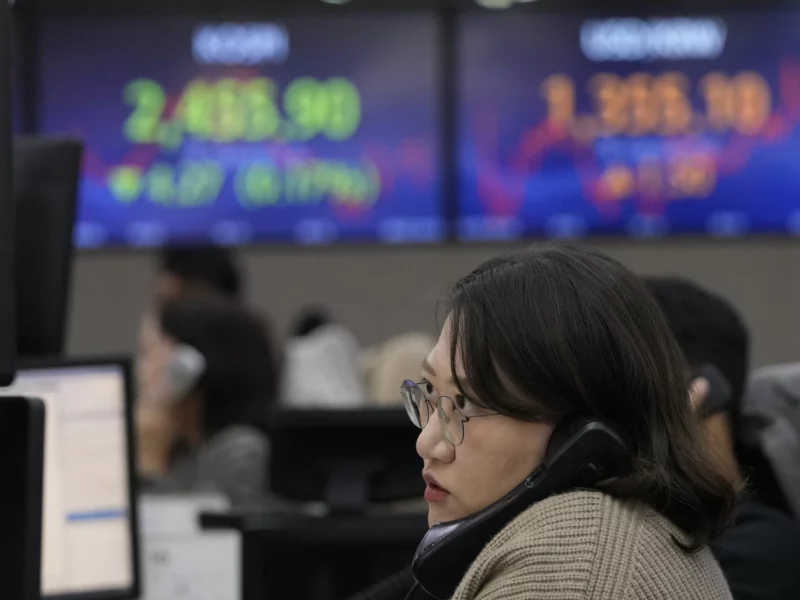After China revealed that its economy expanded at a 4.9% annual pace in July–September, down from 6.3% in the previous quarter, shares have dropped throughout Asia.
U.S. futures also decreased, although oil prices increased by $2.
According to China’s National Bureau of Statistics, the world’s second-largest economy shrank in the summer as export demand fell and the struggling real estate market grew more troubled.
The Chinese government has taken steps to support the economy, including increasing investment on port construction and other infrastructure projects, lowering loan rates, and loosening restrictions on home purchases. However, analysts assert that broader reforms are required to address longer-term issues that are impeding growth, such as a rapidly aging population and declining productivity.
According to analysts, the two biggest clouds hovering over the economy in the foreseeable future are the sluggish global demand and the real estate sector.
Capital Economics stated in a research that “green shoots are appearing, but the overall data on the property sector remained weak.” It stated that “new housing starts continued to decline and are currently at their lowest levels since 2005.”
Shanghai Composite index fell 0.6% to 3,064.76 and the Hang Seng in Hong Kong lost 0.1% to 17,755.25.
At 32,003.18, the Nikkei 225 in Tokyo was likewise down 0.1%. The S&P/ASX 200 in Australia increased by less than 3 points to 7,060.50, and the Kospi in South Korea increased by less than 0.1% to 2,461.78.
India’s Sensex fell less than 0.1% while Bangkok’s SET increased by 0.5%.
The S&P 500 fell by less than 1 point on Tuesday, reaching 4,373.20. The Nasdaq composite dropped 0.3% to 13,533.75, while the Dow Jones Industrial Average increased by less than 0.1% to 33,997.65.
According to a research released on Tuesday, consumers spent more at American retailers last month than analysts had predicted. However, an overheated economy might potentially fuel inflation further and force the Fed to maintain high interest rates in an effort to choke it down. Stock and other investment prices would suffer as a result of this action.
Treasuries’ yields increased in the bond market. By late Monday, the yield on the 10-year Treasury had increased to 4.83% from 4.69%.
The stock market has been affected by a sharp increase in the 10-year yield since the summer as traders increasingly agree with the Fed’s predictions that it will likely maintain rates high for a long time.
The central bank is pondering whether to raise its main interest rate one more time after recently raising it to its highest level since 2001.
After the U.S. government expanded its regulations to prevent China from getting cutting-edge computer chips and the machinery needed to build them, Nvidia and other chipmakers came under increased pressure. Nvidia dropped 4.7%.
After releasing their most recent earnings reports, a number of significant American firms saw gains.
With a 2.3% increase, Bank of America was contributing to the market’s leadership after exceeding Wall Street’s third-quarter earnings projections.
Following the release of its own stronger-than-anticipated quarterly profit, Bank of New York Mellon’s stock increased 3.8%.
For the first time in a year, profits are expected to have increased throughout the summer for businesses in the S&P 500 index as a whole.
After competitor Choice Hotels International revealed it wants to acquire Wyndham Hotels & Resorts for $90 per share in cash and shares, valuing the company at $7.8 billion, Wyndham Hotels & Resorts saw a 9% increase.
Wyndham claimed it turned down the offer because it was “underwhelming.” Choice’s stock dropped 6.8%.
Wednesday saw a rise in the price of crude oil as concerns grew that a conflict in the Middle East, if it included Iran or other significant oil-producing nations, could disrupt supplies.
In computerized trading on the New York Mercantile Exchange, the price of a barrel of American crude for delivery in November rose $2.15 to $88.81 per barrel. After fluctuating between gains and losses throughout the day, it remained steady on Tuesday. The benchmark crude, Brent, increased $1.98 to $91.88 a barrel.
The dollar dropped to 149.67 Japanese yen in currency trade from 149.82 yen. From $1.0576 to 1.0579, the euro increased.











